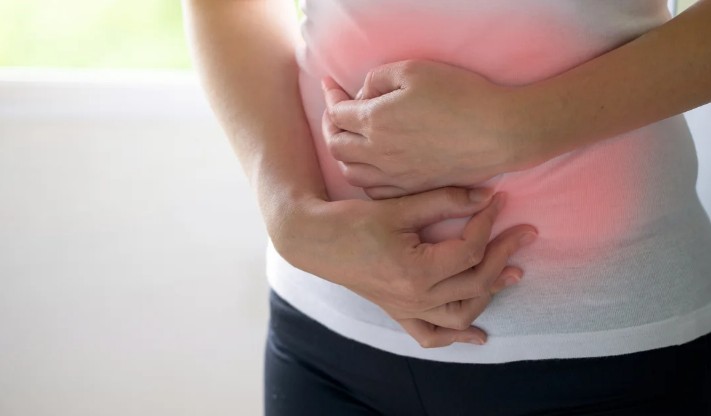Digestive difficulties happen to everyone now and then, and they’re no one’s idea of a good time. According to a study published in the American Journal of Gastroenterology in 2018, 61 percent of nearly 72,000 adults in the United States reported having at least one gastrointestinal (GI) symptom in the previous week, and 58 percent of that group said they’d had two or more GI symptoms in the previous week.
Because symptoms such as constipation, heartburn, and abdominal discomfort are often vague and have no evident explanation, persons who are experiencing them are prone to fearing the worst.
Dr. Byron Vaughn, an assistant professor of medicine and co-director of the IBD program at the University of Minnesota in Minneapolis, says that “people are quite anxious about GI symptoms—they often worry that there is something terrible going on, such as cancer.”
“People don’t get social support since it’s not socially acceptable to discuss about GI problems at cocktail parties or other social gatherings, so they wind up worrying about their symptoms more and more.”
This can increase stress levels, which can exacerbate digestive problems in many cases. Fears of symptom flare-ups can have a negative impact on mental well-being and quality of life for people with irritable bowel syndrome (IBS), which is characterized by stomach pain and changes in bowel habits (such as constipation, diarrhea, or alternating bouts of the two).
Patients with IBS had a higher prevalence of depression and a lower quality of life than those without the disorder, according to research. Overall happiness is also on the decline.
To avoid unneeded anxiety and stress, it’s time to put common concerns about intestinal health to rest. Continue reading to learn more about the most common anxieties that gastroenterologists hear from their patients.
The fear: Constipation, whether regular or chronic, raises your chance of colon cancer.
The facts: It was once considered that prolonged interaction with possibly carcinogenic or toxic chemicals in feces could raise the risk of colon cancer. However, research have shown that this is not the case.
“Constipation does not increase the risk of colon cancer—they’re two completely different issues,” Vaughn adds. When it comes to the risk of colon cancer, “transit time doesn’t matter.”
Furthermore, according to the National Institute of Diabetes and Digestive and Kidney Diseases, constipation affects around 16 percent of all adults and 33 percent of persons over 60 in the United States.
Given that some people have numerous bowel movements per day while others have them every couple of days, people have diverse conceptions about what it means to be constipated. (Constipation is defined by the American Gastroenterological Association as having fewer than three bowel movements per week or having difficult-to-pass stool movements.)
A diet high in red meats, smoked foods, and processed foods, as well as smoking, moderate to heavy alcohol consumption, lack of regular physical activity, obesity, inflammatory bowel disease such as Crohn’s disease or ulcerative colitis, and a family history of colorectal cancer, are all risk factors for colorectal cancer.
Because the occurrence of colorectal cancer has been rising among younger adults, the US Preventive Services Task Force lowered the age at which people with average risk should start screening to 45 from 50 in 2021.
The fear: Ulcers are caused by stress.
Here are the facts: Long-term use of nonsteroidal anti-inflammatory drugs (NSAIDs) such as ibuprofen, naproxen, ketoprofen, and aspirin, or infection with the bacterium Helicobacter pylori, are the most common causes of peptic ulcers, which are sores on the lining of the stomach or duodenum (the first part of the small intestine) (H. pylori).
“Ulcers are caused by a breakdown in prostaglandin synthesis, which disrupts the mucosal protective barrier, which acts as an acid-proofing barrier for the stomach lining,” says Dr. Christine Lee, a gastroenterologist at the Cleveland Clinic.
“NSAIDs inhibit the production of prostaglandins in the body.” H. pylori bacteria, on the other hand, can directly disrupt the mucous layer, allowing stomach acid to enter the stomach or duodenal lining.
According to studies, there is a synergistic association between long-term NSAID usage and H. pylori infection, which leads to the formation of ulcers sooner than NSAID use alone. Your doctor may give pain relievers such as proton pump inhibitors, histamine receptor blockers, or protectants, depending on the etiology of your peptic ulcer.
All of this isn’t to say that stress can’t create stomach problems. According to Vaughn, stress can create a gnawing or searing ache from dyspepsia (indigestion). Although the symptoms may resemble those of an ulcer, they are not caused by one.
The fear: Having diarrhea on a regular basis can indicate ulcerative colitis or Crohn’s disease.
According to Dr. Shaham Mumtaz, a gastroenterologist at Northwestern Medicine Regional Medical Group in the Chicago region, repeated diarrhea episodes are more likely due to a food sensitivity, irritable bowel syndrome, or medication side effects than to one of these inflammatory bowel illnesses. “Some foods pull more fluid into the gut and can cause bloating and diarrhea,” Mumtaz adds about eating. “Some people react to them more sensitively than others.”
For patients with IBS or small-intestinal bacterial overgrowth, meals high in fermentable oligosaccharides, disaccharides, monosaccharides, and polyols (FODMAPs)—short-chain carbohydrates or sugars—can be problematic.
Milk and other dairy products, wheat, beans, and lentils, some fruits (such as apples and mangoes), some vegetables (such as asparagus, broccoli, brussels sprouts, and garlic), and artificial sweeteners are all rich in FODMAPs.
According to research, 52 percent of persons with IBS who experience frequent diarrhea who followed a low FODMAP diet for four weeks saw significant improvement in their symptoms.
Unintended weight loss, changes in appetite, abdominal pain, bloody stools, exhaustion, and prolonged diarrhea for more than four weeks with a lot of frequency and urgency are all red signs for ulcerative colitis or Crohn’s disease, according to Mumtaz.
If you’re experiencing these symptoms, consult a gastroenterologist, who may recommend an endoscopy or colonoscopy, as well as imaging studies and stool samples, to identify one of these inflammatory bowel illnesses.
The worry: Hemorrhoids raise your chances of getting rectal cancer.
Hemorrhoids are enlarged blood vessels in and around the anus and lower rectum, similar to varicose veins, that are quite common. External hemorrhoids form under the skin of the anus, while internal hemorrhoids form in the lining of the anus and the lower rectum.
Dr. Cindy Yoshida, a gastroenterologist and professor of medicine at the University of Virginia Health System in Charlottesville, adds, “Take a good look with a mirror—they look like a group of grapes around the anus.”
They may also itch, and if irritated, they may bleed when you wipe your bottom after a bowel movement. “Bleeding from rectal cancer might be mistaken for hemorrhoids—the bleeding can look the same on toilet paper,” Yoshida explains. That’s why it’s critical to have any rectal bleeding checked out by a physician.
The fear: Going to the bathroom shortly after eating indicates that food is passing past you and you are not receiving the nutrients.
The facts: Some people have an overactive gastrocolic reflex, which regulates the lower gastrointestinal tract’s motility after eating.
When people with irritable bowel syndrome have a highly sensitive or heightened gastrocolic response, when they start eating and their stomachs expand, they experience colonic spasms, which leads to a bowel movement, Vaughn adds.
But it’s not the food they just ate that they’re passing. It’s what was sitting in their colon, indicating that the food they just ate was still being digested and absorbed.
The fear: Sluggish digestion indicates a potentially dangerous obstruction.
The facts: It’s most likely a problem with gastrointestinal motility, not an obstruction. “Consider the stomach as a pipeline: if there’s an obstruction, things won’t travel south,” Yoshida explains.
This implies they’ll most likely head north, causing severe nausea and vomiting as well as a severely swollen or bloated stomach.
“If you had a blockage, you definitely wouldn’t be meeting me in the office because you’d be really sick,” says Dr. Seth Gross, a professor of medicine and clinical chief of the division of gastroenterology and hepatology at NYU Langone Health. You can’t go around like that.”
The truth is that as people age, their gut motility slows down, and certain medical disorders, such as diabetes and hypothyroidism, as well as certain pharmaceuticals, such as narcotic pain relievers, can slow down the rate at which food passes through the digestive tract.
Yoshida suggests that if this is a new problem, you should talk to your doctor about it. However, if it’s been bothering you for a long time, it’s most likely due to your own naturally slow intestinal motility.
The fear: foul-smelling farts or excrement indicate a problem with your digestive system.
The facts: Your diet’s contents are often reflected in the way you smell. “You can generate methane gas, hydrogen sulfide gas, carbon dioxide, or ammonia depending on what you feed your intestines,” Yoshida explains.
She claims that hydrogen sulfide gas, which is produced by consuming meat, eggs, and fish, stinks the worst. Consuming a lot of cruciferous vegetables, such as broccoli, cabbage, and onions, can also lead to foul-smelling flatulence and stools.
The fear: Something is wrong if you detect undigested food in your stool.
The facts: According to Lee of the Cleveland Clinic, seeing particles of undigested food in the toilet isn’t normally cause for alarm. “Like life, your colon isn’t always courteous and orderly,” which explains why food particles might be seen in the toilet after a bowel movement.
Because some high-fiber meals, such as corn, carrots, nuts, seeds, and whole grains, “are not designed to be broken down by the body,” Mumtaz explains, “we should anticipate them to come out of the body intact.”
To put it another way, this is proof that your high-fiber diet is working. However, if you don’t chew your food sufficiently, undigested food particles may surface.
Rest assured: seeing undigested food particles in your stool is usually nothing to be concerned about. When accidental weight loss, exhaustion, or weakness occur, as well as when feces appear oily and are difficult to flush because they adhere to the toilet, gastroenterologists anticipate a malabsorption problem, Mumtaz explains.
A stool sample, blood tests to look for nutritional deficiencies or inflammatory indicators, an endoscopy to examine the upper digestive tract, or a colonoscopy to examine the lower gastro-intestinal tract may likely be recommended if your doctor is worried.
The fear: Nuts and seeds will cause diverticulitis if eaten.
The facts: Diverticulitis is a condition in which tiny pouches in the digestive tract’s lining become inflamed and infected. According to Vaughn, the assumption that nuts, seeds, berries, and other minute particles of food could plug pouches in the colon and cause diverticulitis has been discredited.
“You can eat these meals even if you have diverticulitis as long as you don’t feel bad afterward,” he says.
The exact causes of diverticulitis are yet unknown. While it was previously thought that a low-fiber diet and constipation increased a person’s risk of getting diverticulitis due to increased pressure within the digestive tract and straining during bowel movements, new evidence contradicts this theory.
In a study published in the journal Clinical Gastroenterology and Hepatology in 2021, researchers followed the health of Nurses’ Health Study participants for 24 years and discovered that those who had more than one bowel movement per day had a 30 percent higher risk of developing diverticulitis, while those who had less than one BM per day had an 11 percent lower risk.
The fear: if you lift weights, you’ll have a hernia.
The facts: To be honest, this is only half-truth. An abdominal hernia occurs when a portion of an organ, such as the intestine, pushes through a weak spot in the abdominal wall, resulting in a protrusion beneath the skin.
Any activity that requires you to bear down—such as straining to poop due to constipation, chronic coughing or sneezing, or lifting heavy weights—as well as anything that raises intra-abdominal pressure, such as obesity and pregnancy—increases your risk of having an abdominal hernia.
But it’s not a foregone conclusion. Many people lift weights without developing hernias. “No one can identify who is at danger of acquiring a hernia,” adds Gross. Some people are born with one, while others develop one as a result of a weakening in their abdominal wall. A family history of hernias, smoking, and past abdominal surgery are all risk factors in some cases.
The crucial thing to remember is that “if you have a hernia, you should avoid placing pressure on that area,” according to Gross. In other words, if you have an abdominal hernia and engage in severe weight training or other hard forms of exercise, you risk exacerbating or worsening the hernia’s symptoms.





